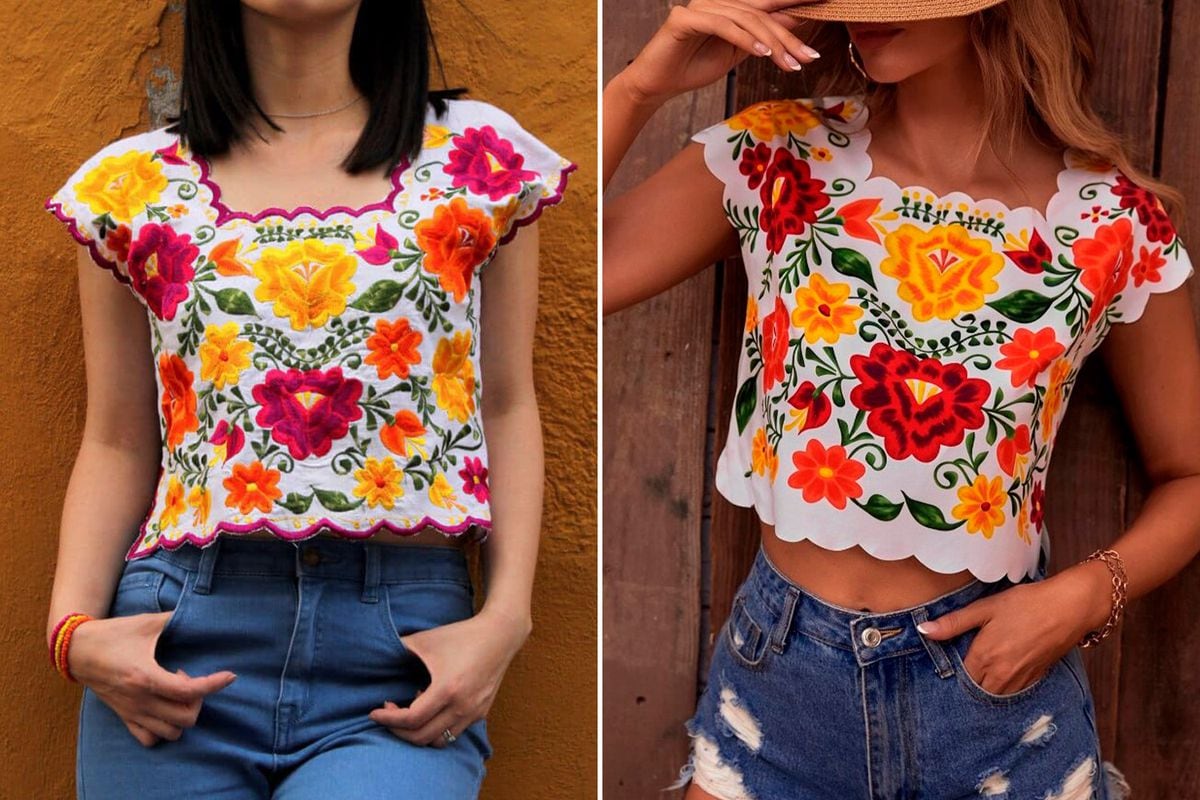The Mexican government has asked the Chinese brand Shein for an explanation for the launch of a blouse "identical" to a Mayan huipil made in 2017 by Yucatecan artisans.
The Secretary of Culture, Alejandra Frausto, has sent a letter to the Asian firm in which she criticizes the "undue cultural appropriation" of a garment designed by Yucachulas, a handmade clothing firm in the Gulf of Mexico.
The action joins others initiated by the Mexican authorities against companies such as Zara, Mango, Levi's, Oysho, Nike, Rapsodia, Louis Vuitton or Carolina Herrera to protect the intellectual property of indigenous communities.
The blouse launched by Shein mimics the red, yellow and orange flowers and green leaves of the original garment;
she also copies his court.
It is "an identical piece", says the Ministry of Culture in the letter, "except for the edges of the neck, sleeves and the finish of the final arches".
"These designs have been passed down from generation to generation, so they are the product of a collective creativity that corresponds to the Mayan people," she reads.
"These flowers," the letter continues, "not only represent part of the environment and nature, but are part of their worldview" and their origin "is fully documented."
The original piece, a short hupil, is a type of garment made by some Mayan communities in the states of Yucatán, Campeche and Quintana Roo, in the south of the country.
In addition to being an expression of the identity of those who make them, these pieces are an important part of their economy.
In a statement released on Facebook, the Yucachulas project has lamented that this type of imitation devalues artisan work.
"The most demeaning thing," they say, "is the cost at which they are offered to the market."
"The quality is not the same, we agree on that, but the cost at which they are given is not even a quarter of what it costs to make it by hand," he reads.
The blouse, which is no longer available in
Shein's
online store, was sold for 144 Mexican pesos (almost seven dollars).
The Ministry of Culture has expressed in the letter its "disagreement" with the imitation and has asked the brand to explain "on what grounds it privatizes a collective property" and "how its use repays benefits to the creative communities."
In addition, the authorities have invited the firm to "develop respectful work with the communities" that "does not undermine the identity and economy of the peoples."
In short, that "it places indigenous creators, businessmen and designers on an equal footing."
Shein, which has a presence in 150 countries, did not comment publicly on the letter on Wednesday.
From @cultura_mx, we strongly oppose the misappropriation of pieces that are part of the identity and culture of the Mayan people, by the company @SHEIN_Official. The @GobiernoMX defends the rights of indigenous peoples.
#MexicoEsOriginal pic.twitter.com/bmnIA2ca0q
– Alejandra Frausto (@alefrausto) July 21, 2022
The letter joins others sent by the Government of Andrés Manuel López Obrador within the framework of the Original strategy for "the defense of the cultural heritage of the original communities."
One of the most recent was the claim that the Ministry of Culture made to the US brand Levi's for incorporating designs by indigenous Oaxacan artisans into its jeans and jackets.
Before that, they had also criticized Oysho's copy of bags designed in San Andrés Larráinzar, in the state of Chiapas.
Or the Resort 2020 collection, by Carolina Herrera, which included a long dress with embroidery from the community of Tenango de Doria, in Hidalgo;
in response, the designers claimed that they were “trying to enhance the magnificent cultural heritage”.
One issue, that of the separation between inspiration and cultural appropriation,
In addition, in January, Mexico approved the Federal Law for the Protection of the Cultural Heritage of Indigenous and Afro-Mexican Peoples and Communities to "protect traditional cultural manifestations" and establish the bases "so that indigenous and Afro-Mexican peoples and communities define the use, enjoyment and use of its cultural heritage and, where appropriate, its use by third parties.
One of its promoters, Senator from Morena Susana Harp, told this newspaper before the regulations were approved: “Communities ask for respect, they don't ask for money.
They want designers to come up to them and ask for permission."
subscribe here
to the
newsletter
of EL PAÍS México and receive all the informative keys of the current affairs of this country








